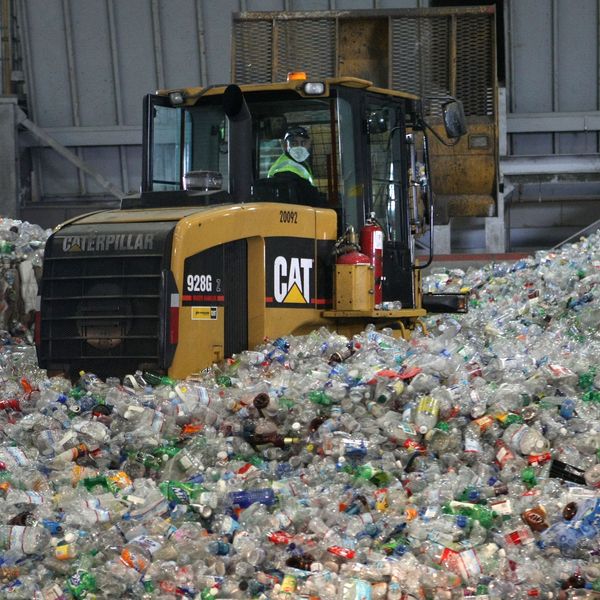Despite a greenwashed new image,
Walmart is still one of the country's biggest polluters, guilty of externalizing the cost of their negligence on people and the environment, says a new report published Wednesday by the
Institute for Local Self Reliance (ILSR). Since 2005 when Walmart's then-CEO Lee Scott announced that the retail giant would transform itself into a leader on environmental sustainability, little change has actually occurred outside of a "new media narrative" and a "significant shift in the company's image."
What the report, Walmart's Assault on the Climate: The Truth Behind One of the Biggest Climate Polluters and Slickest Greenwashers in America (pdf), uncovers is that despite frequent pronouncements by Walmart about their efforts to improve efficiency, reduce waste and expand the use of renewable energy, the amount of greenhouse gases emitted by the company has grown 14 percent--reaching 21 million metric tons per year--and counting, according to data filed with the Carbon Disclosure Project.
"If it were included in the Greenhouse 100 Polluters Index, a list that is limited to heavy industrial firms, such as oil companies and power plants," writes report author Stacy Mitchell, Senior Researcher for ILSR, "Walmart would take the 33rd spot, just a hair behind Chevron, America's second largest oil company."
The report's other findings include:
- Walmart lags other retailers in making the shift to renewable power. Deriving only 4 percent of the electricity consumed by stores from its wind and solar projects, lagging dramatically behind other big box retailers including staples (102%), Kohl's (105%) and Best Buy (12%). The amount of renewable power used by Walmart declined last year because of a lack of "competitive pricing," explained the company.
- Walmart ignores major sources of climate pollution in its operations. Major sources of greenhouse gases omitted from their pollution accounting include their international shipping operation, land development and construction, increased driving by consumers, and manufacture of store-brand products.
- Walmart's supply chain pollution reduction claims lack accountability. Recent accidents including the Tazreen factory fire and the collapse of the Rana Plaza complex in Bangladesh demonstrate Walmart has "no credibility with regard to its supply chain." Further, reporting by the Associated Press revealed that the company had been "instrumental in scuttling an industry-wide garment factory safety initiative in Bangladesh in 2011."
- Walmart finances candidates who block action on climate. According to data published by the Center for Responsive Politics, between 2005 and 2012, Walmart and the Walton family gave more than half of their total Congressional campaign donations to members of Congress who voted against the environment at least 70 percent of the time.
"Walmart is failing on climate exactly like it is failing on worker's rights," wrote the Sierra Club in a statement following the report's release. "The company's carbon pollution is up 14 percent while it pours millions of dollars into a misleading PR campaign around sustainability and anti-environmental public officials who obstruct solutions to climate disruption. If Walmart wants us to live better it can start by treating its workers with the dignity and respect they deserve and taking real steps to cut carbon pollution."
Joining the Sierra Club, a number of leading of environmental organizations including Friends of the Earth and the Rainforest Action Network published an open letter to Walmart demanding "fundamental change" to the retail giant's business model which, they say, "continues to elevate profits above all else and leave devastation in its wake."
The letter calls on Walmart to: implement a publicly verifiable and accurate tracking of all of their climate change emissions, make an overall 20 percent reduction in emissions, and stop funding the campaigns of those who oppose legislation to address the climate crisis.
"Walmart is profitable because it externalizes its costs onto people, including its own workers, and the environment," the groups write. "We affirm that true sustainability entails a commitment to a viable future for both the environment and people."
_____________________



